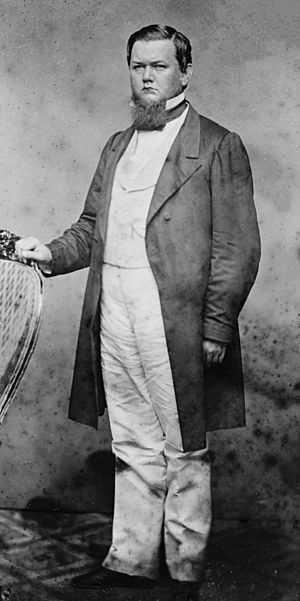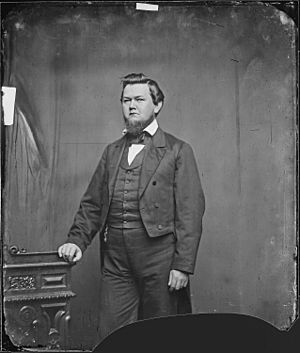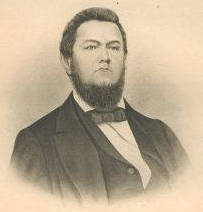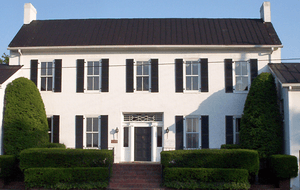Henry Cornelius Burnett facts for kids
Quick facts for kids
Henry Burnett
|
|
|---|---|
 |
|
| Confederate States Senator from Kentucky |
|
| In office February 18, 1862 – May 10, 1865 |
|
| Preceded by | Constituency established |
| Succeeded by | Constituency abolished |
| Member of the U.S. House of Representatives from Kentucky's 1st district |
|
| In office March 4, 1855 – December 3, 1861 |
|
| Preceded by | Linn Boyd |
| Succeeded by | Samuel Casey |
| Personal details | |
| Born | October 25, 1825 Essex County, Virginia, U.S. |
| Died | October 1, 1866 (aged 40) Hopkinsville, Kentucky, U.S. |
| Political party | Democratic |
| Signature | |
| Military service | |
| Allegiance | |
| Branch/service | |
| Years of service | 1861–1862 |
| Rank | |
| Unit | 8th Kentucky Infantry |
| Battles/wars | American Civil War |
Henry Cornelius Burnett (born October 25, 1825 – died October 1, 1866) was an American politician who played a big role during the American Civil War. He served as a Senator for the Confederate States of America from Kentucky between 1862 and 1865. Before that, from 1855 to 1861, Burnett was a member of the United States House of Representatives for four terms.
Burnett was a lawyer. His only public job before being elected to Congress was working as a clerk for a local court. He represented a part of Kentucky known as the Jackson Purchase region. This area was more supportive of the Confederate side than other parts of Kentucky. Burnett was a strong supporter of states' rights and the Southern cause. He even promised his voters that he would accuse President Abraham Lincoln of serious wrongdoing. A newspaper editor named George D. Prentice once described Burnett as a "big, burly" person who often raised objections to challenge the Republicans in the House.
Besides his work in Congress, Burnett also helped Kentucky support the Confederacy. He led a special meeting in Russellville in 1861. This meeting created a Confederate government for Kentucky. Burnett was chosen to go to Richmond, Virginia to help Kentucky join the Confederacy. He also helped create a Confederate army group (a regiment) in Hopkinsville, Kentucky, and served in the Confederate States Army for a short time. A Confederate recruiting camp was even named after him: Camp Burnett.
Burnett's actions were seen as disloyal by his fellow members of Congress. Because of this, he was removed from the House of Representatives in 1861. He is one of only five people ever to be removed from the House. After being removed, Burnett continued to serve in the Confederate government. He was a member of the Provisional Confederate Congress and later a Senator in the First and Second Confederate Congresses. After the war, he was accused of serious wrongdoing but was never put on trial. He went back to being a lawyer and passed away in 1866 at the age of 40.
Contents
Early Life and Family
Henry Cornelius Burnett was born on October 25, 1825, in Essex County, Virginia. His parents were Dr. Isaac Burnett and Martha F. Garrett. When he was young, his family moved to Cadiz, in Trigg County, Kentucky. Henry received private lessons at a school in Hopkinsville. After his schooling, he studied law and became a member of the Cadiz Christian Church.
On April 13, 1847, Burnett married Mary A. Terry. Her father was a well-known merchant in Cadiz. Henry and Mary had four children: John, Emeline, Henry, and Terry. Sadly, Terry passed away shortly after birth. Their son, Henry C. Burnett, later became a successful lawyer in Paducah and Louisville.
Beginning His Career
Burnett became a lawyer in 1847 and started his own law practice in Cadiz. He also owned enslaved people. In 1850, he owned five enslaved people in Trigg County. By 1860, he owned seven enslaved people in Cadiz and also leased three others to someone in Christian County.
After Kentucky's new Kentucky Constitution was approved in 1850, voters in Trigg County chose Burnett to be the clerk of the local court. He won against James E. Thompson. Burnett left this job in 1853 to run for Congress.
Later that year, he was elected as a Democrat to the 34th Congress. He took the place of Linn Boyd, who had been the Speaker of the House. Burnett was re-elected three more times. During the 35th Congress, he led a committee that looked into the sale of Fort Snelling. He also served on a committee for the District of Columbia.
Start of the Civil War
In the 1860 presidential election, Burnett supported John C. Breckinridge for president. However, Breckinridge lost to Abraham Lincoln. Lincoln had campaigned against allowing slavery to spread to new states. When Lincoln won, seven Southern states decided to leave the Union. Even though many people thought the Union could still be saved, Burnett disagreed. In a newspaper article on January 7, 1861, he wrote that there was "not the slightest hope" of solving the problems. Despite his doubts, Burnett supported a meeting in 1861 that tried to find a peaceful solution, but it did not succeed.
After several Southern states left the Union quickly, Congress started getting the country ready for war. This included making the army and navy stronger and raising money. Burnett tried to stop these plans by suggesting that no new money should be used to fight against the Southern states. However, his idea was voted down.
To try and avoid war, the Kentucky General Assembly called for a meeting of border states in Frankfort on May 27. Kentucky's twelve representatives for this meeting were to be chosen in a special election on May 4. But after Confederate soldiers attacked Fort Sumter on April 12, the candidates who supported leaving the Union dropped out of the election. Burnett thought the meeting would not happen, but it did. However, it didn't achieve anything important.
Special Congressional Elections of 1861
President Lincoln called for special elections in Kentucky in June 1861. The Southern Rights party in the First District held a meeting on May 29, 1861, at the Graves County courthouse in Mayfield. The main goal of the meeting was to nominate Burnett again for his congressional seat. However, some people who supported the Union believed there was another reason for the meeting. George D. Prentice, a Unionist newspaper editor, wrote on May 21, 1861, that the meeting's goal was likely to separate the First District from Kentucky if Kentucky stayed in the Union, and then join it with Tennessee.
Most of the records from the Mayfield Convention were lost in a courthouse fire in 1864. The best record we have comes from the notes of James Beadles, who was a Unionist watching the meeting. After many speeches, a committee led by Judge James Campbell presented a report with seven resolutions. These resolutions stated that the region supported the South but would follow Kentucky's plan to stay neutral for now. It criticized President Lincoln for starting an unfair war and praised Governor Beriah Magoffin for not sending troops to Lincoln. The report also criticized the federal government for giving weapons, called "Lincoln guns," to Union supporters in the state. Another report, given by Oscar Turner, said that Kentucky's neutrality was "useless" and "cowardly." It promised to fight off any invasion from the North and suggested asking for help from Tennessee and the Confederate States if such an invasion happened. It also warned that if the whole state didn't agree with this, the Purchase region would leave Kentucky and join Tennessee.
Burnett, along with Willis B. Machen and Benjamin P. Cissell, first supported Campbell's report. After some discussion, Burnett suggested four new resolutions instead of both reports. His resolutions criticized President Lincoln for the war and the federal government for the "Lincoln guns." They also praised Governor Magoffin for refusing Lincoln's request for troops and encouraged him to stop any Union invasion of the state. Burnett's resolutions were passed by many votes over the other reports.
Finally, the meeting discussed nominating Burnett. Four other people were also suggested. Burnett received 124 out of 155 votes on the first try and was chosen by everyone on the second try. In his speech, Burnett said he wasn't sure if he would take the oath of office if elected. This was because Turner had said that "no man who is engaged in the cause of the South could go to Congress and take the oath of office without being dishonest." Burnett promised that if he did take his seat, he would accuse President Lincoln of serious wrongdoing.
In the special elections, Burnett won against Lawrence Trimble. He was the only candidate who supported states' rights to be elected in the whole state. He won easily in the Jackson Purchase region, which was the most pro-Southern part of Kentucky. Outside of that region, he only won in his home county of Trigg, and that was by a very small number of votes.
Burnett took his seat in the 37th Congress. There is no record of him not taking the oath of office. Just days after the First Battle of Bull Run, another Kentuckian, John J. Crittenden, suggested a resolution. It blamed the war on disloyal Southerners and said the war's goal was to keep the Union together without changing states' rights or ways of life. Burnett asked for the question to be split. His request was granted, but only one other person voted with him against blaming Southerners for the war.
Confederate Military Service and Removal from Congress
After Congress ended on August 6, 1861, Burnett went back home to Cadiz. He spoke at many events that supported the Southern cause. On September 4, 1861, Confederate Major General Leonidas Polk broke Kentucky's neutrality by ordering Brigadier General Gideon Johnson Pillow to take control of Columbus. In response, Ulysses S. Grant captured Paducah on September 6, 1861. Since Kentucky could no longer stay neutral, Burnett led a meeting of Kentuckians who supported the South. This meeting happened in Russellville from October 29 to October 31, 1861. The people at this meeting decided to hold another meeting on November 18, 1861, to create a Confederate government for Kentucky.
Between the two meetings, Burnett went to Hopkinsville. There, he and Colonel W.C.P. Breckinridge formed a Confederate army group called the 8th Kentucky Infantry. On November 11, 1861, Burnett joined the Confederate States Army at Camp Alcorn. He was chosen as the colonel of the 8th Kentucky, but he never actually led the group in battle.
The meeting to create a Confederate government happened at the William Forst House in Russellville on November 18, 1861, as planned. Burnett also led this meeting. He first suggested delaying the meeting until January 8, 1862, because he was worried about the safety of the people there. But George W. Johnson convinced most of them to continue. By the third day, the military situation was so difficult that the whole meeting had to move to a tower at Bethel Female College, a school in Russellville that no longer exists.
The meeting passed a rule to leave the Union and set up a temporary Confederate government for Kentucky. Burnett, William Preston, and William E. Simms were chosen to represent this temporary government. They were sent to Richmond, Virginia, to talk with Confederate President Jefferson Davis and get Kentucky accepted into the Confederacy. Even though Kentucky's elected government in Frankfort was against leaving the Union, these representatives convinced Davis to recommend Kentucky's admission. The Confederate Congress officially accepted Kentucky on December 10, 1861.
After his successful trip to Richmond, Burnett joined the 8th Kentucky at Fort Donelson. On February 16, 1862, Ulysses S. Grant led a combined army and navy attack against the fort. Most of the Confederate soldiers were captured, including the 8th Kentucky. However, Burnett escaped with General John B. Floyd after the defeat. This battle marked the end of Burnett's time in the military.
Burnett's actions against the Union did not go unnoticed by his colleagues in Congress. He was not present when Congress met again on December 2, 1861. The next day, William McKee Dunn from Indiana suggested that Burnett be removed from Congress. The resolution passed easily, and Burnett was removed from the seat he had held since 1855.
Confederate Political Service
Burnett represented Kentucky in the Provisional Confederate Congress from November 18, 1861, to February 17, 1862. He was also a member of that group's Finance Committee. He was then elected as a senator to the First and Second Confederate Congresses, serving from February 19, 1862, to February 18, 1865. In the Confederate Senate, he served on committees related to military affairs.
On March 29, Confederate President Jefferson Davis asked the Confederate Congress to pass a bill about drafting soldiers. This bill would require all healthy white men between 18 and 35 to serve in the military for three years. At first, the bill was not popular. But as the war became more difficult for the Confederacy, both parts of Congress quickly passed it. Still, this measure made some people question Davis's military decisions. Burnett, who usually supported Davis, was one of them. In a speech on April 19, 1862, Burnett criticized Davis for preferring officers who, like Davis, had graduated from West Point. The speech received such a strong positive reaction from the audience that some of the most excited people had to be removed.
After the Civil War ended, Burnett tried to meet with President Andrew Johnson, who had been a colleague in Congress. But Johnson told him to go home. Burnett was accused of serious wrongdoing in Louisville, but he was released on bail and never put on trial. He partnered with Judge John R. Grace and continued his law practice in Cadiz. He passed away in Hopkinsville on September 28, 1866. He was first buried in the Old Cadiz Cemetery, but later moved to the East End Cemetery in Cadiz. His tombstone does not mention his service to the Confederacy.
Images for kids
 | Lonnie Johnson |
 | Granville Woods |
 | Lewis Howard Latimer |
 | James West |





